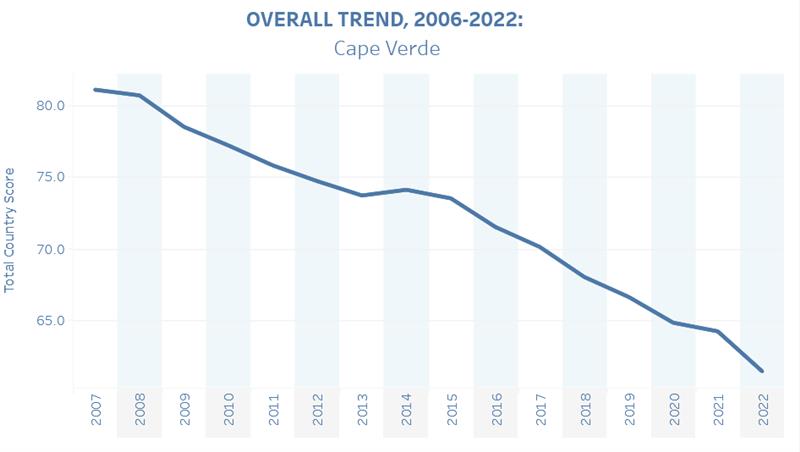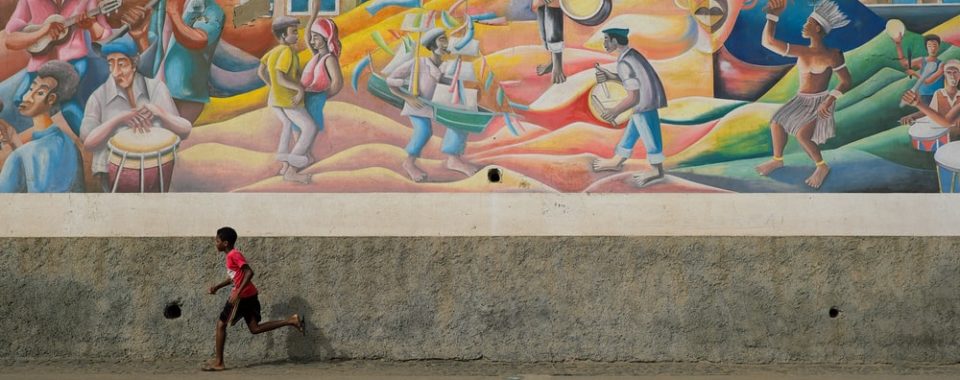BY DYLAN SOUQUET MOGLEN
Over the past three decades, the small island nation of Cabo Verde has become one of the Africa’s most stable democracies; a status that has endured through electoral transitions, ongoing environmental disasters, and rising regional political instability.[i] However, the COVID-19 pandemic presented an unprecedented challenge to this rising star of democracy, with the country confronting major economic and political stressors. So how did Cabo Verde’s democratic systems fare under these unique challenges of COVID-19, challenges that resulted in patterns of democratic backsliding/decline in countries across the globe? FFP’s 2022 FSI analysis of Cabo Verde paints a picture of a country whose democratic systems not only managed to weather the impacts of the pandemic, but even showed growth and resilience. But why is the Cabo Verdean recovery story such a unique one and what lessons can we draw from it?
To understand Cabo Verde’s unique story of recovery and growth over the past year, we must first examine the effects of the pandemic on this small, island nation and how it set the tone for what seemed like an inevitable backsliding. Early pandemic fragility indicators tell a harrowing story, with notable declines in economic stability, access to public infrastructure and demographic pressures. This is hardly surprising given that the country struggled to contend with the increased burden on health and infrastructure systems, made more difficult for a nation comprised of ten disparate islands, with varying access to critical infrastructure. The temporary global collapse of the tourism, which had annually comprised about 25% of the country’s GDP, and comprises up to 60% of its service industry.[ii] , further helped plunge the country into uncertainty.[iii] To make matters worse, Cabo Verde’s long running dependence on external imports – resulting from a low accessibility to arable land and a lack of infrastructure for complex manufacturing – rose sharply as the country became increasingly dependent on foreign aid to obtain desperately needed medical supplies.

Cabo Verde’s political system was also beginning to show cracks, as the country struggled to balance maintaining its upcoming election cycle with the ongoing crises. A delayed decision in late 2020 to hold the parliamentary elections in March 2021 (with the president citing concerns relating to COVID-19) resulted in notable tensions as internal and external observers expressed concern over the state’s ability to respond adequately to COVID.[iv] Internal tensions were also evident following the results of the 2020 local election which saw the opposition party – the Partido Africano da Independência de Cabo Verde (PAICV)- reclaim control of both the capital Praia and the island of São Felipe, campaigning on the accusation that the ruling Movement for Democracy (MpD) was botching their COVID response. With both the Assembly and Presidential elections scheduled for 2021, and demographic and economic pressures on the rise, the stage seemed set for a crisis in the political process.
But the very opposite occurred – not only did Cabo Verde effectively anticipate and manage pandemic-related challenges, but it demonstrated notable efforts towards reducing overall state fragility. Both elections, the parliamentary in March and the presidency in October, were cited by internal and external observers as largely free and fair, occurring without any major incident or rumblings of widespread discontent.[v] Despite fears over the state’s ability to safely hold elections during COVID-19, voter turnout during the local and presidential elections notably rose for the first time in a decade.[vi] The parliamentary election, the first to be held since the country had put in place its 2019 Gender Parity law – requiring a 40% minimum of candidate lists to be female – saw a historic rise in the number of female legislators from ~24% in 2016 to 38%.[vii] The presidential election also saw the PAICV reclaim control of the presidency without any major contention or political unrest. FSI indicators for 2021 additionally showed across the board reductions in fragility, particularly those indicators relating to economic fragility and group grievance. These changes are all the more impressive given that a majority of indicators showed marked improvement over pre-pandemic levels, particularly in regard to perceptions of state legitimacy and respect for human rights. Cabo Verde had not only managed to weather the storm, it bounced back stronger than before.
But how did this small nation avoid many of the political pitfalls that came out of the pandemic period elsewhere? Two major factors are key to the explanation: Cabo Verde’s unique capacity for adaptability and growth (even in the face of crisis) and an established history of peaceful transfers of power and internal political relations. As to the former, Cabo Verde’s consistent pattern of fragility reduction is by no means a new phenomenon. Quite the opposite in fact – the country has remained one of the most consistently improved across the board since data collection on the country as part of the FSI first began in 2006. The country has also proven its remarkable capacity to adapt when, following the 2014 Fogo Volcano explosion, the country rapidly addressed and even improved upon some of the fragility concerns that emerged out of this catastrophe. Secondly, Cabo Verde’s longtime status as an example of successful democratic processes has been largely due to the amiable and peaceful transfers of power that have occurred since the country held its first multiparty elections in 1990. The parties’ commitments to assuring the peaceful exchange of power both during and following elections, coupled with an extraordinary capacity for shared dialogue towards resolving country wide issues, have held the country together during even the most turbulent of crises.
This is not to say that Cabo Verde has fully recovered from COVID-19, nor fully overcome all the challenges the nation faces. The country remains in crisis with much of its population suffering from a five-year ongoing drought and threatened by rapidly rising sea levels. The country is still reeling from the economic shocks it received during COVID-19, as it works to juggle rebuilding its service and tourism economies and its continued heavy reliance on imports.[viii] While Cabo Verde still has much work to do, this past year has more than proven the nation’s extraordinary capacity to restructure and rebuild while maintaining full commitment to its long held democratic principles.
[i] Ferreira, Neima and African Development Bank. “Cape Verde – A Success Story,” November 2012, 62.
[ii] https://www.state.gov/reports/2019-investment-climate-statements/cabo-verde/
[iii] World Bank. “The COVID-19 Pandemic Has Posed Unprecedented Challenges to Cabo Verde’s Economy and Exposed the Vulnerabilities of the Growth Model.” Accessed June 22, 2022. https://www.worldbank.org/en/news/press-release/2021/09/09/the-covid-19-pandemic-has-posed-unprecedented-challenges-to-cabo-verde-s-economy-and-exposed-vulnerabilities.
[iv] Sanches, Edalina Rodrigues. “Parliamentary Elections under Covid-19: The Case of Cabo Verde,” October 2021, 17.
[v] Kodjo, Tchioffo. “African Union Election Observation Mission to the 17 October 2021 Presidential Election in the Republic of Cabo Verde-African Union – Peace and Security Department.” African Union,Peace and Security Department. Accessed June 22, 2022. https://www.peaceau.org:443/en/article/african-union-election-observation-mission-to-the-17-october-2021-presidential-election-in-the-republic-of-cabo-verde.
[vi] “IFES Election Guide | Country Profile: Cape Verde.” Accessed June 22, 2022. https://www.electionguide.org/countries/id/40/.
[vii] Carter, Katherine, and Judy Aulette. Cape Verdean Women and Globalization. New York: Palgrave Macmillan US, 2009. https://doi.org/10.1057/9780230100596.
[viii] “GIEWS Country Brief: Cabo Verde 16-June-2022 – Cabo Verde | ReliefWeb.” Accessed June 22, 2022. https://reliefweb.int/report/cabo-verde/giews-country-brief-cabo-verde-16-june-2022.
Image licensed under Upsplash worldwide copyright license .
